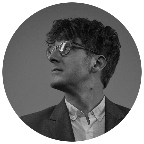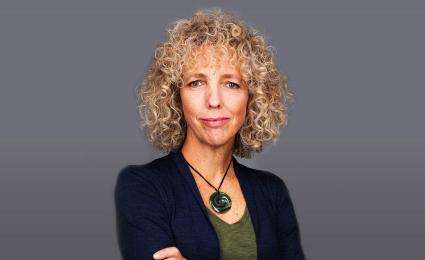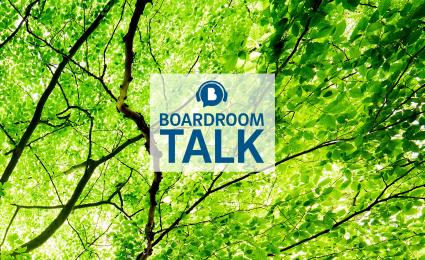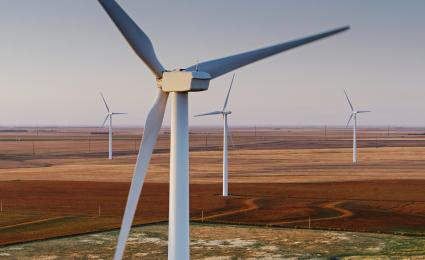Sustainability is changing the world as we know it. What will our lives look like in 2050 – and what can companies do to ensure a livable future?


Developing sustainable technologies for future generations
By Christian Böhler and Hannah Zühlke
Interview with Markus Schönberger, Head of Corporate Sustainability & Ecological Business Management at Voith
In recent decades, sustainability has gained a place high up on the agenda of organizations across the globe. Companies nowadays need to improve their impact on the environment and society and have to pursue holistic sustainability approaches. In order to support companies in their efforts to shape a sustainable future, we have outlined four scenarios of what the world may look like in 2050 in our Think:Act Booklet Sustainarama . Based on these four scenarios, we have spoken with Markus Schönberger, Head of Corporate Sustainability & Ecological Business Management at Voith. In this interview, he told us how Voith has set up a Corporate Sustainability Department that is also backed by the management board and shared his vision on how Voith wants to become a sustainability leader in each of their business areas.

If we continue along our current path, what do you think the world will look like in 2050?
Markus Schönberger: The expected population growth through 2050 presents great challenges for sustainable development and exerts pressure on already strained resources. The intensive usage of natural resources and the ongoing deterioration of the environment could affect the delicate balance of social and ecological systems. Until recently, I would have assumed that if no action had been taken by 2050, this dynamic would have intensified further. However, current developments in corporate sustainability and politics suggest that a change in thinking has taken place. As such, companies from various industries, including Voith, perceive the current situation and the prospect of the near future as an opportunity to develop products and services that are inherently more sustainable. Voith is committed to creating sustainable technologies for future generations. We will achieve this by generating profitable growth to ensure the stability and financial independence of our company, while balancing our business success with our responsibility to society and the environment. Consequently, I expect that we can leverage the identified potentials and make a positive impact if we follow our current path.
"Saving resources instead of wasting them makes ecological and economic sense. That is why corporate sustainability is a viable business case for companies."
Which scenario would you wish for (i.e. planned new world, race for sustainability, minimum viable master plan, or everyone for themselves)?
Markus Schönberger: I advocate for the "Race for sustainability", as this scenario portrays a balanced driving force coming from society, businesses and governments that allows for a more holistic approach to sustainable development.
Saving resources instead of wasting them makes ecological and economic sense. That is why corporate sustainability is a viable business case for companies. Even today, society, insurance companies and the capital market increasingly demand transparency from businesses regarding their sustainability performance, which is why companies actively drive the improvement of their social and environmental impact . The increasing pressure, in turn, fosters business competition and generates entirely new markets for products and services that are inherently more sustainable by offering solutions for pressing socio-ecological problems – this is what corporate sustainability is all about.
What actions is Voith already taking and/or planning to take in order to lead us towards that scenario?
Markus Schönberger: The "Race for sustainability" scenario is characterized by a significant impact of the threefold concept of Environmental Social Governance (ESG) that defines corporate behavior and fosters business competition. As sustainable products contribute to the resolution of pressing sustainability problems, they are perceived as a competitive advantage for businesses and a feature of differentiation. As such, businesses foster environmental and societal improvements that generate tangible economic benefits.
Through our products and our know-how, we want to become a driving force and co-shaper of a decarbonized industry. We derived a clear strategic aspiration from this vision: In each of our business areas, we want to be seen as a pioneer and performance leader in sustainability. Therefore, we have our sustainability performance constantly examined through external ratings, including ISS ESG, and communicate our goals and our progress to enable the greatest possible transparency towards society, regulators and customers.
In our core business, we are already addressing the global megatrends of decarbonization, digitalization and the circular economy – driving regenerative hydropower, enabling paper production from naturally renewable raw materials, and developing drivetrain technologies for efficient, environmentally friendly mobility.
We particularly see opportunities in decarbonization and address the reduction of CO2 emissions in four distinct areas:
- Process improvements and technologies to achieve maximum efficiency and reduce energy consumption
- Digital solutions to realize a data-based reduction in energy and resource utilization
- Utilization of renewable energy and energy storage to optimize energy profiles and foster electrification
- Breakthrough technology that enables disruptive concepts to replace existing products and services by establishing entirely new markets
Sustainability has been a key priority for Voith for the past several years – what has motivated Voith to pursue that path?
Markus Schönberger: Voith unites the tradition of a family-owned company with the needs and culture of a global company. Clearly defined values serve as our compass – and sustainability is one of them. So we are mindful of our responsibility to society and the environment in everything we do. Our technical innovations are intended to contribute towards global growth and wealth and we aim at lasting financial independence. Our values, and the guidelines we derive from them, ensure that Voith acts according to a unified set of business principles and a consistent philosophy worldwide.
Voith is committed to an ecological, fair and successful long-term management approach. We want to make a measurable contribution to the sustainable development of our company, society and the environment. This is why we aim to minimize the environmental impact of our business activities by constantly improving our energy efficiency. Our newly formulated environmental goals, our determination to achieve our CO2 reduction target, and above all our aspiration to achieve net climate neutrality, all reflect our intention. Besides that, Voith stands for safety, quality and reliability worldwide. Hence, durability is one of the key quality features of Voith's products, contributing to lower resource consumption and creating a competitive advantage.
How has Voith embedded sustainability into the organizational setup?
Markus Schönberger: At Voith, sustainability is understood as a cross-sectional task that is supported by the Corporate Board of Management as well as the Corporate Functions and Group Divisions. The Corporate Sustainability Department defines the framework for the strategic orientation and organization of sustainability at Voith and is directly assigned to the Chairman of the Corporate Board of Management.
The Corporate Sustainability Department is the central point of contact for customer inquiries and ratings relating to sustainability. Together with the various Voith departments, it develops strategies and measures for improving sustainability performance and monitors their implementation. Our systematic approach to implementing Voith's sustainability strategy rests on five fields of action. Practicing sustainable corporate governance and our pursuit of profitable growth are just as much a part of these five fields as our responsibility towards our products, our supply chain, the environment and our employees. The notion of sustainability thereby permeates the entire company to ensure the compliance, efficiency and responsibility of Voith's global operations. In the fiscal year 2019/20, the Corporate Sustainability Department refined the sustainability strategy and agreed the corresponding targets with the Group's management. To make this goal measurable, the department evaluates the results of the stakeholder dialog and carries out a detailed determination of Voith's position in the area of sustainability. In workshops with the departments, the corresponding potential for optimization was identified within the strategic fields of action.
What are some of the typical challenges you have met throughout Voith's sustainability journey and how have you overcome these challenges?
Markus Schönberger: Saving resources is a business case. However, a holistic management approach is necessary to identify potential ecological and economic improvements in production and the associated processes and technologies, and to initiate the respective measures. To meet this challenge, Voith has developed and implemented its Ecological Business Management (EBM) at over 90 facilities worldwide. This program aims to add economic value by considering ecological aspects in the areas of energy and resources to merge economy and ecology into one unit. The key tool is the analysis of energy, material and water flows in the plants. We apply the EBM methodology primarily to our own production, but also offer it as a service to our customers to exploit potential for improvement.
As a result, we have managed to increase our energy efficiency by 22% based on the 2011/12 fiscal year, saving over 58,000 tons of CO2 worldwide to date. In total we save around 18 million euros a year through our resource management.
What would be your piece of advice for other companies embarking on their own sustainability journey?
Markus Schönberger: The world is changing rapidly, therefore doing business sustainably means keeping risks firmly in view while at the same time identifying and harnessing the many and varied opportunities that the future offers. On the strategic level we have been acting coherently in this regard for many years. This includes analyzing and internally communicating potential environmental risks, as well as health and safety risks in our production facilities and the violation of human rights in the supply chain.
Another important success factor is collaboration. Corporate sustainability is a complex and interdisciplinary concept that requires joint efforts from multiple departments to address the aforementioned risks and implement the respective measures to face these multidimensional challenges. Therefore, the collaboration among cross-divisional teams is essential and should not be underestimated.
Stay current with our latest insights on sustainability and climate action topics. We will email you when new articles and studies are published.








